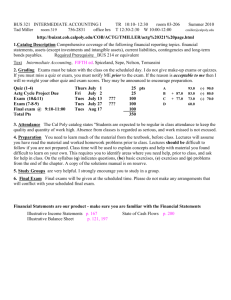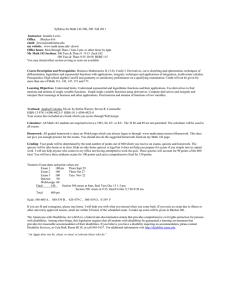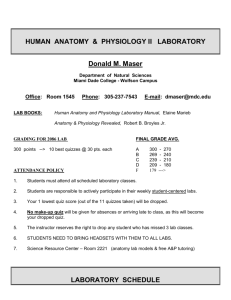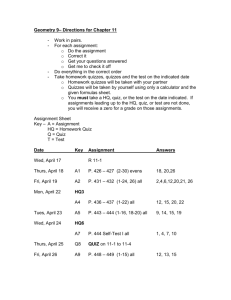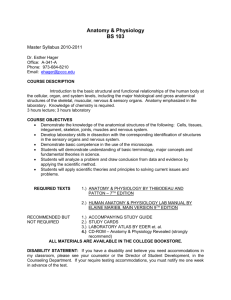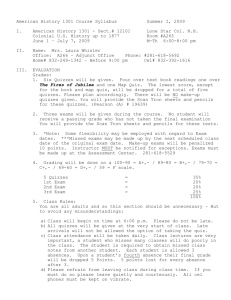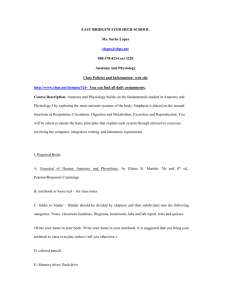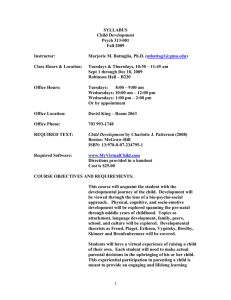BIO 142 - Northern Virginia Community College
advertisement
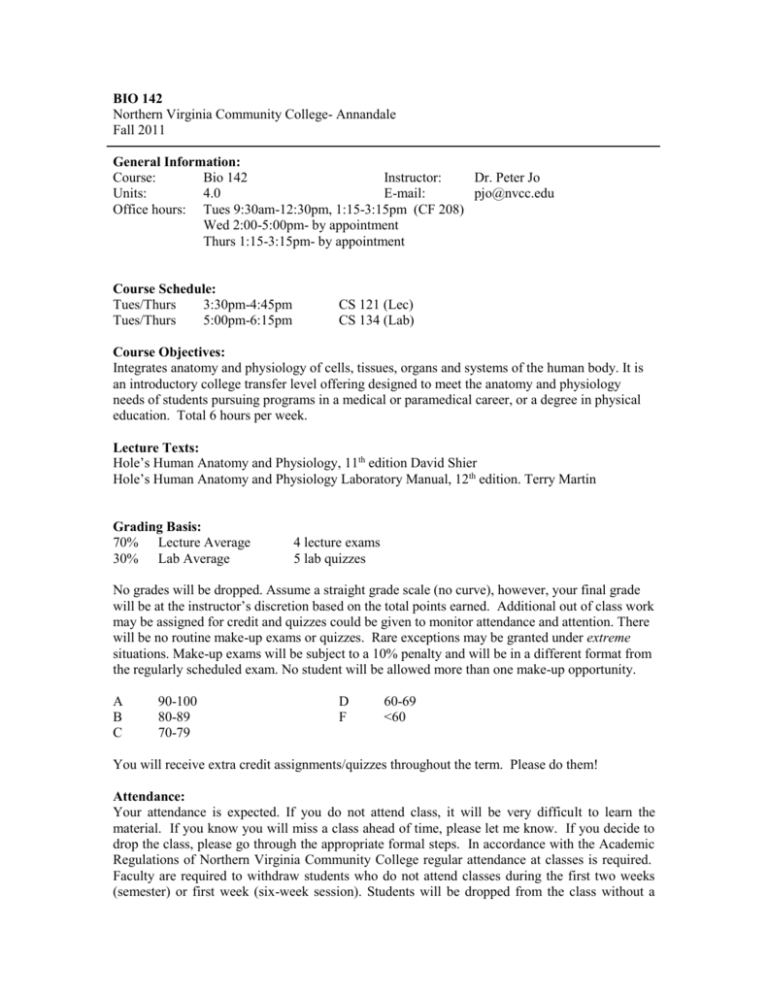
BIO 142 Northern Virginia Community College- Annandale Fall 2011 General Information: Course: Bio 142 Instructor: Dr. Peter Jo Units: 4.0 E-mail: pjo@nvcc.edu Office hours: Tues 9:30am-12:30pm, 1:15-3:15pm (CF 208) Wed 2:00-5:00pm- by appointment Thurs 1:15-3:15pm- by appointment Course Schedule: Tues/Thurs 3:30pm-4:45pm Tues/Thurs 5:00pm-6:15pm CS 121 (Lec) CS 134 (Lab) Course Objectives: Integrates anatomy and physiology of cells, tissues, organs and systems of the human body. It is an introductory college transfer level offering designed to meet the anatomy and physiology needs of students pursuing programs in a medical or paramedical career, or a degree in physical education. Total 6 hours per week. Lecture Texts: Hole’s Human Anatomy and Physiology, 11th edition David Shier Hole’s Human Anatomy and Physiology Laboratory Manual, 12th edition. Terry Martin Grading Basis: 70% Lecture Average 30% Lab Average 4 lecture exams 5 lab quizzes No grades will be dropped. Assume a straight grade scale (no curve), however, your final grade will be at the instructor’s discretion based on the total points earned. Additional out of class work may be assigned for credit and quizzes could be given to monitor attendance and attention. There will be no routine make-up exams or quizzes. Rare exceptions may be granted under extreme situations. Make-up exams will be subject to a 10% penalty and will be in a different format from the regularly scheduled exam. No student will be allowed more than one make-up opportunity. A B C 90-100 80-89 70-79 D F 60-69 <60 You will receive extra credit assignments/quizzes throughout the term. Please do them! Attendance: Your attendance is expected. If you do not attend class, it will be very difficult to learn the material. If you know you will miss a class ahead of time, please let me know. If you decide to drop the class, please go through the appropriate formal steps. In accordance with the Academic Regulations of Northern Virginia Community College regular attendance at classes is required. Faculty are required to withdraw students who do not attend classes during the first two weeks (semester) or first week (six-week session). Students will be dropped from the class without a refund. Students are responsible for all material missed and, if possible, any laboratory exercise missed should be made up. The instructor reserves the right to withdraw any student who misses more than twenty percent of the classes. Comments: Please do not cheat! You will fail the course and immediately be expelled from the class if you cheat. No exceptions. Any action that compromises your academic integrity will be considered cheating. This rule applies to exams, quizzes, homework, extra credit work and any other assignments given during the semester. For written assignments and/or extra credit assignments, do not plagiarize. That is a form of cheating. The only material allowed during an exam is a pen or pencil. The instructor has the right to penalize students caught in the act of cheating or after the act is committed as evidence materializes. No cell phones, pagers, blackberries, ipods, dictionaries or other materials are allowed during an exam. All electronic items must be turned off during exams. Notes: All students are expected to have access to Blackboard. Tips for Success in A&P 1. Be consistent: If you fall behind, it is difficult to catch up as concepts build on one another. A&P is not a topic that is easy to “cram” two days before the exam. Studying 1 hour a day is usually better than studying 2 hours every other day 2. Form study groups: Find at least one partner in this class and get together at least twice a week- even if it is only for10 minutes after class. a. Share notes with each other. Make photocopies and exchange notes to decrease the chance that you missed something in lecture. b. Give a 5 minute lecture to your partner about the major points from the lecture c. When you learn bones & muscles, grab those bones and muscles on your partner (with his/her permission of course). Don’t just stare at pictures. d. Whenever possible, use fancy ‘anatomy’ words like “proximal, distal, ventral, superior, antagonistic etc.” e. When you study a topic, use as many words to describe it as possible. For example, when you locate the humerus on your partner, don’t just find it and move on. Talk about it; for example, “part of the appendicular skeleton, articulates with the scapula proximally, articulates with the radius and ulna distally, has a head, forms the glenohumeral joint proximally, is a long bone, has the following bumps/notches/grooves etc.” 3. Write exam questions after each lecture: After each lecture or lab, write down 3-5 multiple choice exam questions. All your lecture exams come in a multiple choice format. Many students say, “I know the material, I’m just a poor test-taker.” Test-taking is just another skill that can be developed. If you and 2 friends work together, you will have a very nice test bank and will be prepared for any question I can ask on exam day. 4. Review your notes within a few hours of class. If there is something you don’t understand, use the index in your book to find the topic and read about it. If you are still having problems, write down a specific question. Don’t just say, “I don’t understand the electrical stuff with muscles.” It’s better to say, “I don’t understand the role of sodium in generating an action potential.” Then ask me. 5. Be efficient. Many students spend hours making beautiful flashcards but don’t take the time to learn what they are writing down. Flashcards are very useful but don’t just copy down bold words from your text without thinking about them. Think about what you’re writing. If you’re reading the same paragraph over and over because you’re daydreaming while reading (the bad kind of multitasking), then stop. Get up, watch tv, go for a run, call a friend, take a nap. Don’t study for 2 hours in that mode. It gives the illusion of “hard work” and only leads to burn out & frustration later on. 6. Use the textbook as a reference. You have an excellent textbook. But because of the nature of anatomy, some chapters are very difficult to read front to back. For example, the chapters on the skeleton and muscles are full of charts & lists. Reading the entire chapter in one sitting will probably result in very little retention. Break up your study session into meaningful sections. 7. Make it make sense. After you memorize the fact that the hamstrings flex the knee and extend the hip, ask yourself, “Why should I care about this? Why should I stretch my hamstrings? What will happen if I don’t? Why do people ‘pull’ this muscle?” You don’t need to know the answers to these questions to do well in this class, but it will make your experience more interesting, more fun, and more relevant to your life. 8. Put in the time. Learning the language of A&P and all its concepts requires a huge commitment of time. Most people will need to invest a minimum of 8-10 hours a week outside of class in order to earn a passing grade. 9. Ask questions. Ask before, during or after class. Ask during labs. The more you ask, the better you’ll learn. This is true regardless of your personality, learning styles etc. I can’t help you if I don’t know where you are in your progress. 10. Take your time during exams. For each of your lecture exams, I have allotted nearly 2 hours. Most students finish before 2 hours, leave the room and then complain about ‘silly mistakes.’ If you finish the exam in 1.5 hours; close your eyes, take a mental vacation, sing your favorite song (internally) then check your answers. I give you enough time for you to eliminate all your ‘silly mistakes.’ Course Schedule WEEK DATE 1 Aug 23/25 TOPIC Neurons Text Ch 10 Lab Ex 25 2 Aug 30/Sep1 CNS Ch 11 Ex 25, 27 3 Sept 6/8 PNS LAB QUIZ 1 (thurs) Ch 11 Ex 28 4 Sept 13/15 EXAM 1 (tues) ANS (Ch10-11) Ex 26, 28 5 Sept 20/22 Special Senses Ch 12 Ex 32, 34 6 Sept 27/29 Endocrine LAB QUIZ 2 (tues) Ch 13 Ex 20, 31, 33, 35 7 Oct 4/6 Endocrine Ch 13 Ex 58,36 8 Oct 11/13 Reproductive Ch 22 Ex 57 9 Oct 18/20 EXAM 2 (tues) LAB QUIZ 3 (tues) (Ch 12,13, 22) 10 Oct 25/27 DNA/RNA, Proteins Genetics Immune Ch 4 (p124-138) Handouts Ch 24 Ch. 16 11 Nov 1/3 Immune/lymphatic Ch. 16 12 Nov 8/10 Digestive Ch. 17 13 Nov 15/17 EXAM 3 (tues) LAB QUIZ 4 (tues) (Ch 22, 4, 24) 14 Nov 22/24 GI/ Kidneys No Class 15 Nov 29/Dec 1 Kidneys Ch. 20 Ex 54 16 Dec 6/8 Water Balance+ Ch 21 LAB QUIZ 5 17 Dec 15 Final Exam 2:00-3:50pm Dec 15 Final Exam Sept 08- last day to drop with tuition refund October 31- last day to withdraw without grade penalty Ex 46

